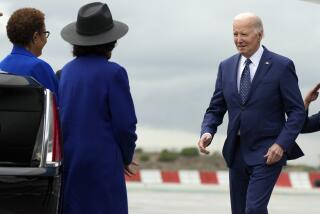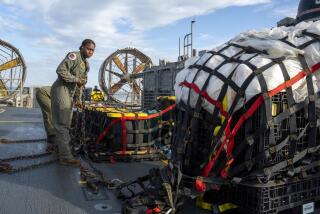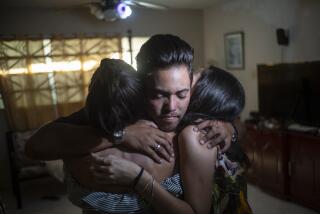Clinton Outlines Sanctions on Cuba for Downing Planes
WASHINGTON — President Clinton severed all remaining commercial air links with Cuba on Monday and outlined additional sanctions to punish Fidel Castro’s government for shooting down two unarmed civilian aircraft, but he stopped far short of a naval blockade or other military action.
In a brief statement to reporters at the White House, Clinton scoffed at Cuba’s explanation that the planes, operated by an anti-Castro Cuban emigre group, were destroyed because they had violated Cuban airspace.
“These small airplanes were unarmed, and clearly so,” Clinton said. “Cuban authorities knew that. The planes posed no credible threat to Cuba’s security. Although the group that operated the planes had entered Cuban airspace in the past on other flights, this is no excuse for the attack and provides . . . no legal basis under international law for the attack.”
He said that the attack by a Cuban MIG-29 was “further evidence that Havana has become more desperate in its efforts to deny freedom to the people of Cuba.” He vowed to do everything in his power to bring democracy to the island nation.
Nevertheless, Clinton left in place several steps taken in October to ease the isolation of the Cuban public while maintaining the economic embargo against the Havana government.
For instance, he banned all charter airline flights between Cuba and the United States, but he did not ban visits to Cuba by U.S. residents as long as they travel by way of third countries.
A senior administration official said the sanctions are “focused as tightly as possible on the Cuban government” while maintaining the links that Clinton adopted last year to reach around Cuba’s government to its people.
Clinton said that all other proposals, including military action, remain under consideration.
Domestically, the steps were intended to quell anger in the Cuban American community, a group that has been unenthusiastic about Clinton’s Cuba policy in the past. Jorge Mas Canosa, a hard-line Cuban American leader, said of the sanctions: “We are encouraged, upbeat, by the decision made by the president.”
In addition to ending charter flights between Miami and Havana--the only passenger air service between the two countries--Clinton urged Congress to authorize the use of money from the Cuban government’s frozen bank accounts to pay compensation to the families of the victims of Saturday’s downings.
The president also offered to negotiate with Republicans on Capitol Hill to draft legislation tightening the embargo on Cuba and authorized an increase of nearly $10 million in the budget of Radio Marti to permit the U.S.-operated station to overcome Cuban jamming of its broadcasts, which are intended to provide Cubans with news about their country. Clinton also imposed new restrictions on the activities of Cuban diplomats in the United States.
In addition, the administration said that it will urge the U.N. Security Council to take action against Cuba, although officials declined to provide specifics. The council discussed the incident Sunday night but postponed formal action until later in the week to give Cuba’s foreign minister a chance to get to New York to participate in the debate.
Critics complained that Clinton’s package was little more than a slap on the wrist. Sen. Bob Dole (R-Kan.), a Republican presidential hopeful, complained that “Clinton’s weak actions . . . did not match his tough rhetoric.”
In Havana, the Cuban government angrily accused Washington of lying about the incident. In tone, Cuba’s comments Monday were substantially more aggressive than the explanation offered a day earlier. At the time, the government placed most of the blame on Brothers to the Rescue, the Cuban emigre organization that operated the aircraft.
“Those planes were over Cuban waters,” Ricardo Alarcon, Cuban National Assembly president, insisted during a news conference in Havana.
“The American government has been an accomplice or has at least tolerated” constant violations of Cuban airspace by Brothers to the Rescue, he said. ‘The greatest responsibility is that of those irresponsible people that direct a government incapable of enforcing its own laws.”
A Cuban Foreign Ministry statement said that it has maps plotting the planes’ progress on radar, as well as taped conversations and objects found in Cuban waters that belonged to the pilots.
“They have found nothing in international waters,” Alarcon said.
A senior administration official, asked to reconcile the contrasting U.S. and Cuban assertions over the location of the planes, responded: “We are right and they are wrong.” He did not elaborate.
Cuban authorities said that a former flier for Brothers to the Rescue has defected to Havana and will confirm Cuba’s side of the story. Although the authorities’ statement did not provide additional information, it said: “This pilot knows a lot.”
In Miami, Cuban exiles identified the pilot as Juan Pablo Roque, 42, a former Cuban air force major who turned up in Miami four years ago claiming to be an anti-Castro defector. He twice flew with Brothers to the Rescue.
Exile sources said that Roque now appears to have been a Cuban infiltrator. In Washington, U.S. officials agreed with that assessment.
Minutes after the president spoke, anguished Cuban Americans with plans to visit the island began calling ABC Charters, one of two Miami companies that fly to Cuba.
“They were crying, hysterical, saying: ‘Why are they doing this to us again? They are using us as pawns,’ ” said company President Vivian Mannerud.
Last year, more than 100,000 Cuban Americans traveled to the island to visit relatives. That total was expected to be even higher this year.
Kempster reported from Washington and Darling from San Salvador. Special correspondent Mike Clary in Miami also contributed to this report.
More to Read
Sign up for Essential California
The most important California stories and recommendations in your inbox every morning.
You may occasionally receive promotional content from the Los Angeles Times.










